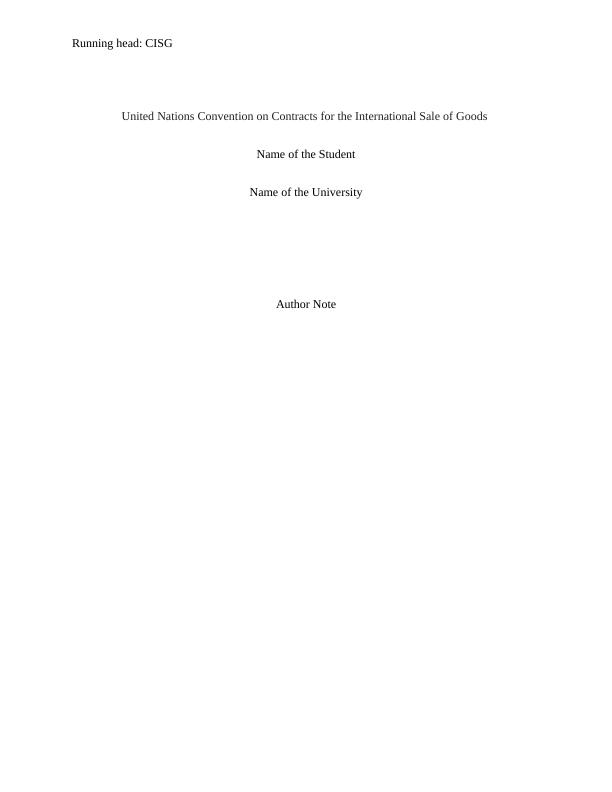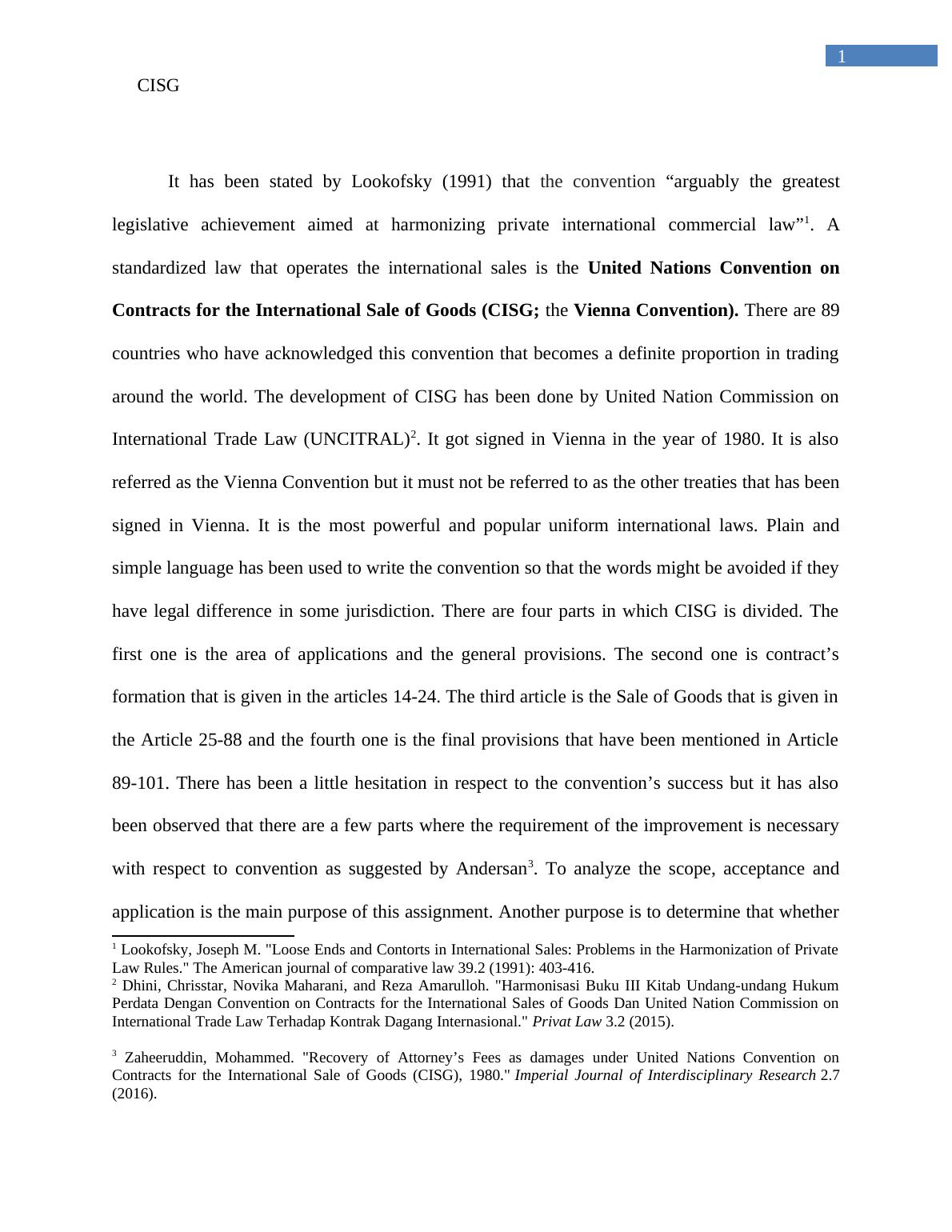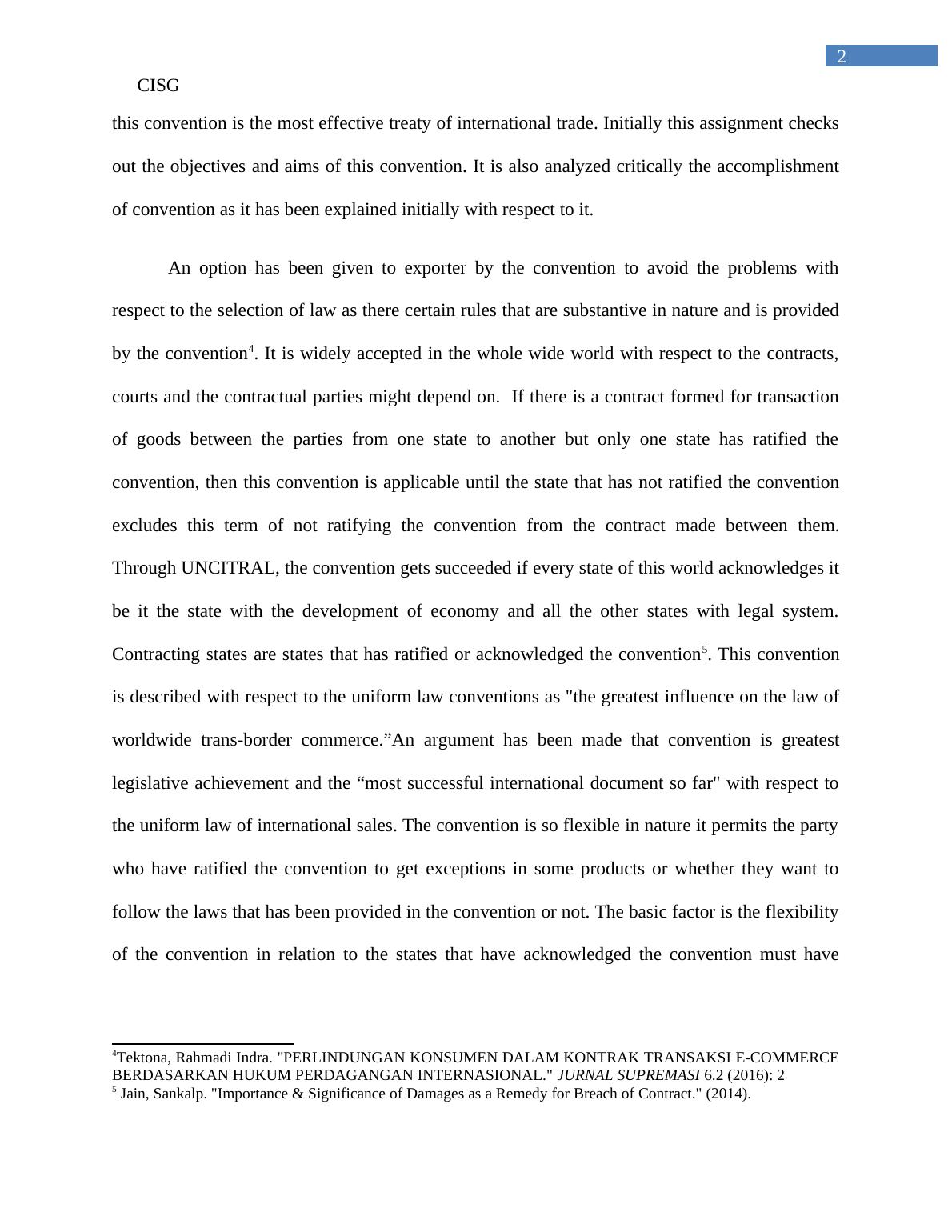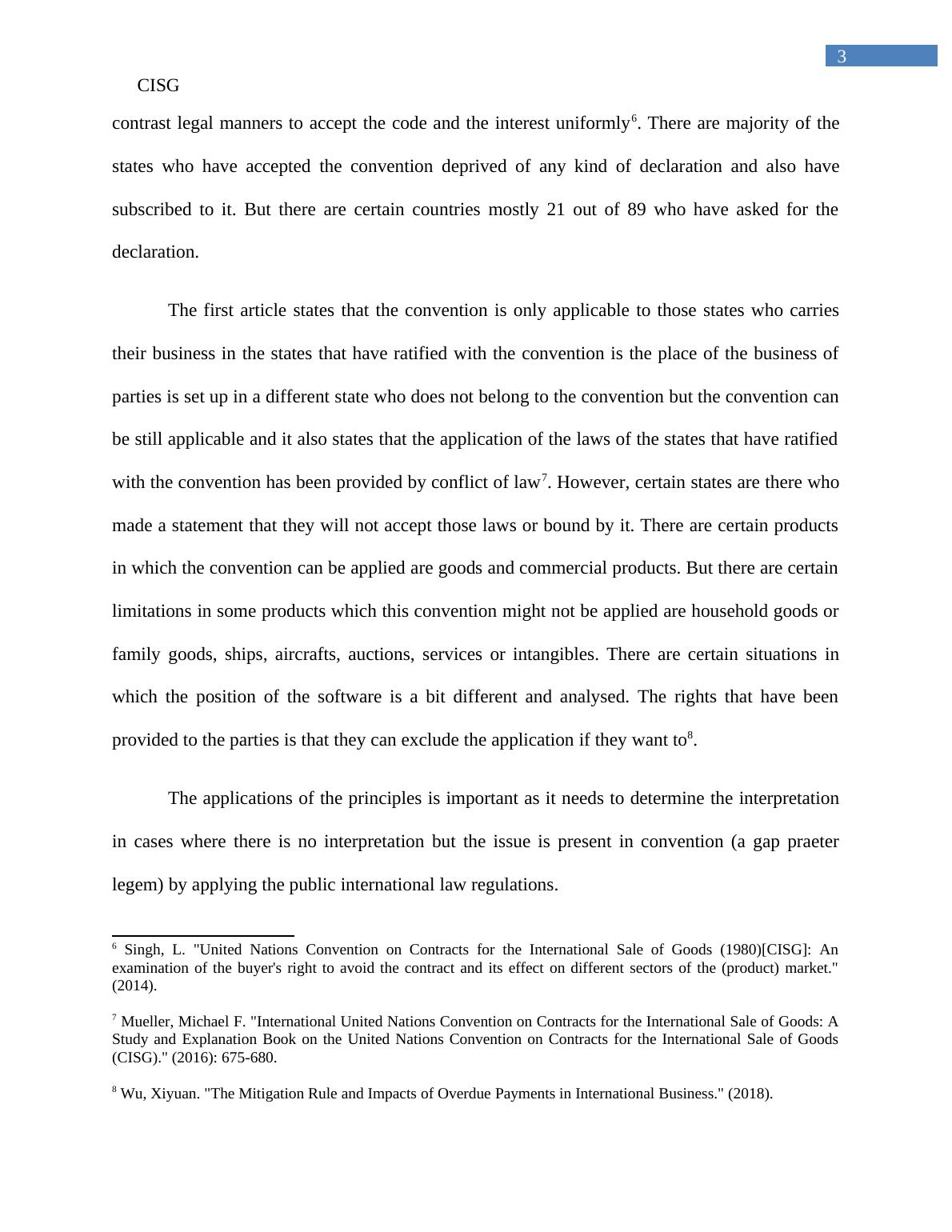United Nations Convention on Contracts for the International Sale of Goods
14 Pages3916 Words218 Views
Added on 2021-06-14
United Nations Convention on Contracts for the International Sale of Goods
Added on 2021-06-14
ShareRelated Documents
Running head: CISG United Nations Convention on Contracts for the International Sale of GoodsName of the StudentName of the UniversityAuthor Note

1CISG It has been stated by Lookofsky (1991) that the convention “arguably the greatestlegislative achievement aimed at harmonizing private international commercial law”1. Astandardized law that operates the international sales is the United Nations Convention onContracts for the International Sale of Goods (CISG; the Vienna Convention). There are 89countries who have acknowledged this convention that becomes a definite proportion in tradingaround the world. The development of CISG has been done by United Nation Commission onInternational Trade Law (UNCITRAL)2. It got signed in Vienna in the year of 1980. It is alsoreferred as the Vienna Convention but it must not be referred to as the other treaties that has beensigned in Vienna. It is the most powerful and popular uniform international laws. Plain andsimple language has been used to write the convention so that the words might be avoided if theyhave legal difference in some jurisdiction. There are four parts in which CISG is divided. Thefirst one is the area of applications and the general provisions. The second one is contract’sformation that is given in the articles 14-24. The third article is the Sale of Goods that is given inthe Article 25-88 and the fourth one is the final provisions that have been mentioned in Article89-101. There has been a little hesitation in respect to the convention’s success but it has alsobeen observed that there are a few parts where the requirement of the improvement is necessarywith respect to convention as suggested by Andersan3. To analyze the scope, acceptance andapplication is the main purpose of this assignment. Another purpose is to determine that whether1 Lookofsky, Joseph M. "Loose Ends and Contorts in International Sales: Problems in the Harmonization of PrivateLaw Rules." The American journal of comparative law 39.2 (1991): 403-416.2 Dhini, Chrisstar, Novika Maharani, and Reza Amarulloh. "Harmonisasi Buku III Kitab Undang-undang HukumPerdata Dengan Convention on Contracts for the International Sales of Goods Dan United Nation Commission onInternational Trade Law Terhadap Kontrak Dagang Internasional."Privat Law3.2 (2015).3 Zaheeruddin, Mohammed. "Recovery of Attorney’s Fees as damages under United Nations Convention onContracts for the International Sale of Goods (CISG), 1980."Imperial Journal of Interdisciplinary Research2.7(2016).

2CISG this convention is the most effective treaty of international trade. Initially this assignment checksout the objectives and aims of this convention. It is also analyzed critically the accomplishmentof convention as it has been explained initially with respect to it.An option has been given to exporter by the convention to avoid the problems withrespect to the selection of law as there certain rules that are substantive in nature and is providedby the convention4. It is widely accepted in the whole wide world with respect to the contracts,courts and the contractual parties might depend on. If there is a contract formed for transactionof goods between the parties from one state to another but only one state has ratified theconvention, then this convention is applicable until the state that has not ratified the conventionexcludes this term of not ratifying the convention from the contract made between them.Through UNCITRAL, the convention gets succeeded if every state of this world acknowledges itbe it the state with the development of economy and all the other states with legal system.Contracting states are states that has ratified or acknowledged the convention5. This conventionis described with respect to the uniform law conventions as "the greatest influence on the law ofworldwide trans-border commerce.”An argument has been made that convention is greatestlegislative achievement and the “most successful international document so far" with respect tothe uniform law of international sales. The convention is so flexible in nature it permits the partywho have ratified the convention to get exceptions in some products or whether they want tofollow the laws that has been provided in the convention or not. The basic factor is the flexibilityof the convention in relation to the states that have acknowledged the convention must have4Tektona, Rahmadi Indra. "PERLINDUNGAN KONSUMEN DALAM KONTRAK TRANSAKSI E-COMMERCEBERDASARKAN HUKUM PERDAGANGAN INTERNASIONAL."JURNAL SUPREMASI6.2 (2016): 25 Jain, Sankalp. "Importance & Significance of Damages as a Remedy for Breach of Contract." (2014).

3CISG contrast legal manners to accept the code and the interest uniformly6. There are majority of thestates who have accepted the convention deprived of any kind of declaration and also havesubscribed to it. But there are certain countries mostly 21 out of 89 who have asked for thedeclaration.The first article states that the convention is only applicable to those states who carriestheir business in the states that have ratified with the convention is the place of the business ofparties is set up in a different state who does not belong to the convention but the convention canbe still applicable and it also states that the application of the laws of the states that have ratifiedwith the convention has been provided by conflict of law7. However, certain states are there whomade a statement that they will not accept those laws or bound by it. There are certain productsin which the convention can be applied are goods and commercial products. But there are certainlimitations in some products which this convention might not be applied are household goods orfamily goods, ships, aircrafts, auctions, services or intangibles. There are certain situations inwhich the position of the software is a bit different and analysed. The rights that have beenprovided to the parties is that they can exclude the application if they want to8.The applications of the principles is important as it needs to determine the interpretationin cases where there is no interpretation but the issue is present in convention (a gap praeterlegem) by applying the public international law regulations.6 Singh, L. "United Nations Convention on Contracts for the International Sale of Goods (1980)[CISG]: Anexamination of the buyer's right to avoid the contract and its effect on different sectors of the (product) market."(2014).7 Mueller, Michael F. "International United Nations Convention on Contracts for the International Sale of Goods: AStudy and Explanation Book on the United Nations Convention on Contracts for the International Sale of Goods(CISG)." (2016): 675-680.8 Wu, Xiyuan. "The Mitigation Rule and Impacts of Overdue Payments in International Business." (2018).

End of preview
Want to access all the pages? Upload your documents or become a member.
Related Documents
United Nations Convention on Contracts for the International Sale of Goodslg...
|16
|5036
|434
International Lawlg...
|5
|839
|124
International Sale of Goods Report 2022lg...
|13
|2573
|25
Business Law and International Perspective Presentation 2022lg...
|12
|674
|14
Import & Export Theorylg...
|6
|1021
|261
Role(s) of the United Nations Convention on Contracts for the International Sale of Goods (CISG)lg...
|23
|7347
|1
